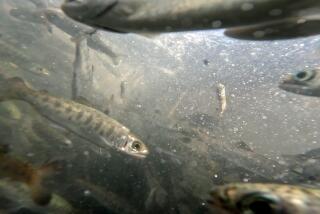Farmed Atlantic salmon escape into Washington state waters. Here’s why fishermen are worried
Washington state officials are asking anglers to come catch as many Atlantic salmon as they can pull from the waters around the San Juan Islands. No restrictions on hours, size or limit. No kidding.
But the reason behind the sudden open season is worrying. A fish-farm spill occurred Saturday off Cypress Island when anchor lines on a commercial net pen with more than 300,000 salmon gave way, allowing thousands of the 10-pound, farm-raised Atlantics to escape and, officials fear, mix with the wild Pacific salmon.
Farm officials said the pen damage was the result of “exceptionally high tides and currents” that occurred in the days leading up to and during Monday’s solar eclipse. Others doubted the moon’s effect on the tides was the cause, noting there have been higher tides without pens being washed out.
The release — the size of the spill could be 5,000 fish or more — probably created a surge in competition among the two species for food and habitat, according to state officials. They say the spill put the more popular native wild salmon at increased risk, particularly the endangered Chinook, a Northwest dinner-plate favorite.
Farm fish, which typically do not fare well outside their pens, are regularly harvested and sold or turned into seafood product.
Experts have long worried about colonization of the two salmon into one species through crossbreeding, and disease is becoming a greater concern. On Wednesday, the Sea Shepherd Conservation Society, responding to concerns about the spill, said research shows that sea lice from salmon farms have been lethally infecting juvenile wild salmon for years.
The society’s ship, the research vessel Martin Sheen, is currently filming the operation of salmon farms in Canada’s British Columbia region, according to spokeswoman Zorianna Kit. The footage reveals a proliferation of disease symptoms among the Atlantic salmon crowded into the pens, including salmon with sea lice, open sores, swollen gills, tumors and deformities, Kit said.
But the Washington Department of Fish and Wildlife says the farm fish do not currently pose a threat to native fish populations through disease or crossbreeding, though the spill needs to be fished out soonest.
“Our first concern, of course, is to protect native fish species,” said Ron Warren, head of the Fish and Wildlife’s fish program. “So we’d like to see as many of these escaped fish caught as possible.”
The department hopes fishers who catch or net the Atlantics report their hauls to the state. A Fish and Wildlife Web page that provides detailed information and sketches used to identify the farm fish notes that the Atlantics “are commercially grown in sea-water net pens in Puget Sound and in some freshwater hatcheries as well. Occasionally some of these fish will escape from their holding pens and may be caught by anglers in fresh or saltwater.”
In a statement, Canadian-based Cooke Aquaculture, which operates the 30-year-old fish farm near Cypress northwest of Anacortes, Wash., said that it did not have a solid estimation of the fish loss, but that “many” salmon remained in the pens. The company “maintains a detailed fish escape and recapture plan as part of its operations, and has implemented that plan in response to this loss of fish.”
Cooke was apparently aware its pens were vulnerable, stating it “applied for permits to allow us to strengthen and update the Cypress site even before the existing fish were harvested out.”
Casey Ruff, who heads a natural resource management group for several local Indian tribes, questioned the company’s explanation for the spill. He could not be reached for comment Wednesday but earlier told Seattle online newsite Crosscut that “amongst the tribes, these net pen operations have been a big concern, and we have grave issues with their proposed expansion and negative effects to wild salmon resources.”
“Our hope is the Department of Ecology comes up with a best management framework for these operations trying to get permits to expand,” he said.
Cooke, a global corporation, is hoping to expand here and proposed a controversial net pen operation in the Strait of Juan de Fuca near Port Angeles. The company vows to do better. “We will work with the relevant authorities to make sure we can employ the best knowledge, technology and the expertise of our global experts as we rebuild the farm,” Cooke officials said in the statement.
Anderson is a special correspondent.
ALSO
Poor little zooplankton – they got totally punk’d by Monday’s eclipse
Riverside County teen accused of trying to smuggle tiger cub into U.S. from Mexico
Interior Department gives Trump list of ‘a handful’ of national monuments to shrink
More to Read
Start your day right
Sign up for Essential California for news, features and recommendations from the L.A. Times and beyond in your inbox six days a week.
You may occasionally receive promotional content from the Los Angeles Times.






